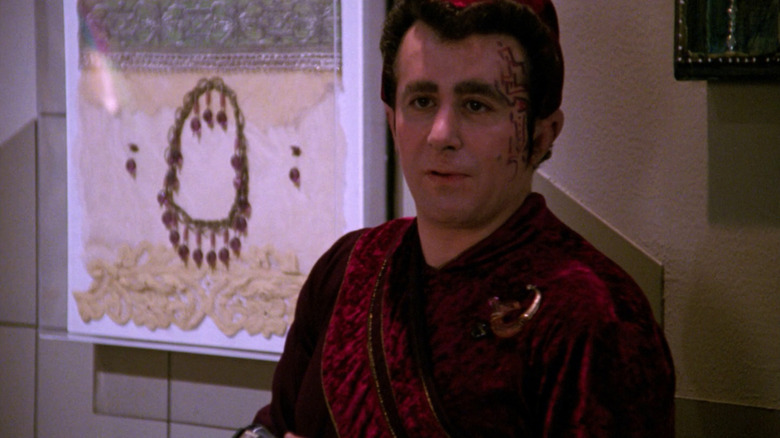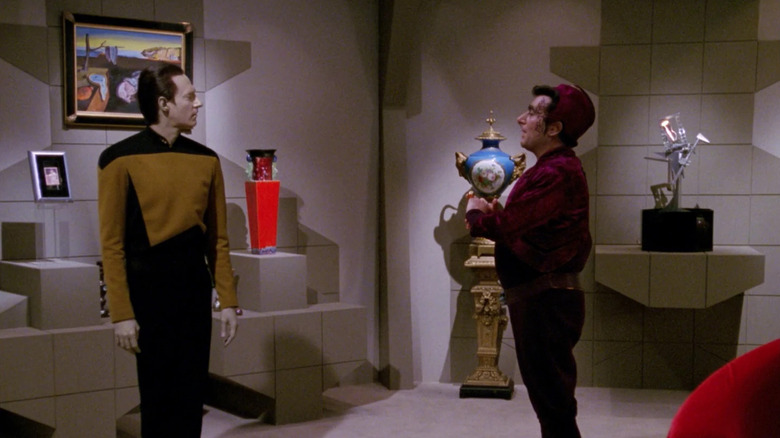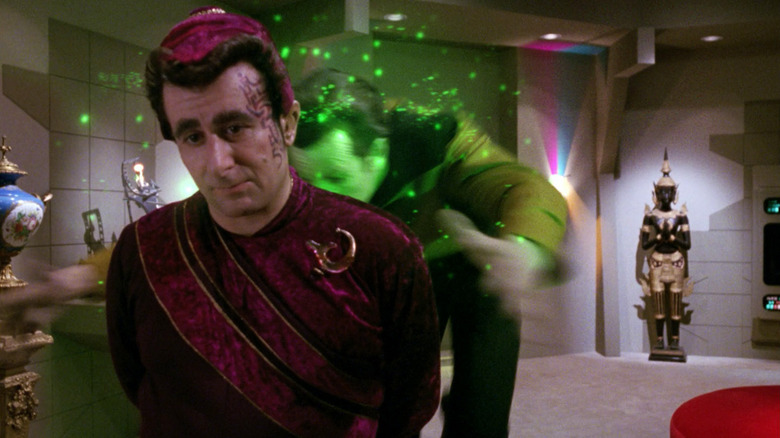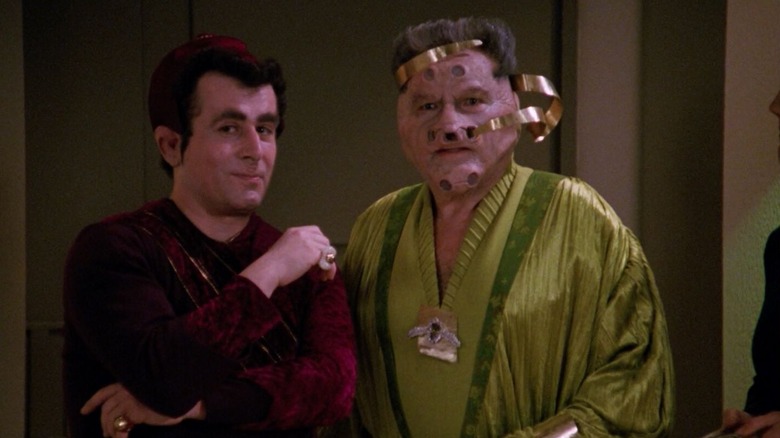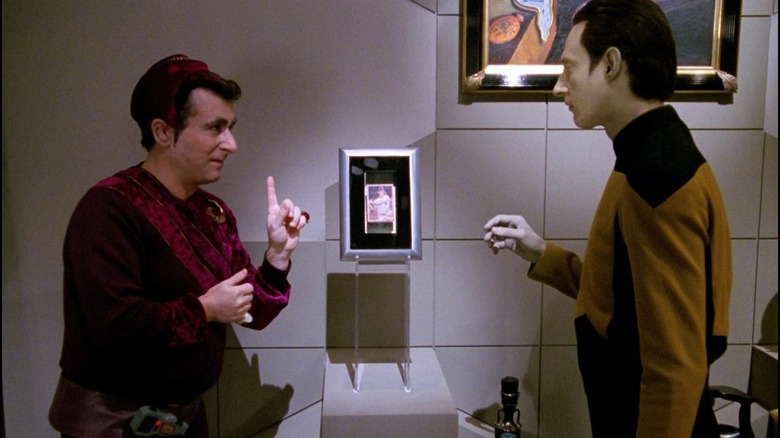Kivas Fajo Is Actually Star Trek's Most Evil Villain
Trekkies may be uncomfortable with words like "hero" and "villain" when it comes to discussions of their beloved media franchise. "Star Trek," when it's operating at peak efficiency, endeavors to present its characters — protagonist and antagonist alike — as complex, nuanced, and driven by principles, rather than merely "good" or "evil." In many of its stories, Trek often sees its characters solving problems either through negotiation or by scientific means. Sometimes that leads into morally gray areas, as when terrorists have legitimate grievances. It's not until one goes to "Star Trek" movies that notions of "heroism" and "villainy" are bandied about. Nero (Eric Bana) from the 2009 "Star Trek" film, for instance, isn't a nuanced character with a negotiable motivation. He's a cartoon monster hellbent on genocide. Nero, however, is an exception to the rule.
All that said, the "Star Trek: The Next Generation" episode "The Most Toys" (May 5, 1990) may have one of the most evil villains in the franchise.
Kivas Fajo, played brilliantly by Saul Rubinek, is a collector. He has spent his whole life acquiring rare antiquities to keep in his storehouse of collectibles. Some may be recognizable to Trek's human audience: famed paintings like the Mona Lisa, The Starry Night, and The Persistence of Memory hang in his gallery. He has a 1962 Roger Maris baseball card that, incredibly, still possesses its original bubblegum scent. He owns the very last lapling, a large-eyed animal thought to have been extinct. Those with sharp eyes might see on an Enterprise on-screen manifest that Fajo also owns the Ark of the Covenant.
'The Most Toys'
In "The Most Toys," Fajo's latest acquisition is exceptionally rare: Data (Brent Spiner). Fajo feels that Data is not a sentient being, but a mere object to be acquired. Fajo arranges a very elaborate plot to make it look like Data died in a shuttlecraft explosion, and kidnap the android. His plan? Merely force Data to sit in a chair in his collection room.
Since the beginning of "The Next Generation," Data's sentience and his status as an autonomous being has rarely been brought into question. In the second season episode "The Measure of a Man" (February 13, 1989), Data's consciousness was literally put on trial, and Captain Picard (Patrick Stewart) had to defend his officer in a court of law. Since then, Data's character and individuality have been widely accepted and respected. That Kivas Fajo sees Data as a mere object is the first sign of his villainy. He converses with Data at length, and points out that he will be held indefinitely.
Fajo also points out that he owns a Varon-T disruptor, a handheld weapon that doesn't just kill its victim, but eats their organs up — incredibly painfully — from the inside. It's the most painful weapon seen on "Star Trek." Data understands that he is too valuable to Fajo to be damaged, and feels every impulse to defy and frustrate him. Fajo throws acid on Data's uniforms to force him to wear the clothes he selected. When Data refuses to sit in his designated chair, Fajo extracts his Varon-T disruptor and turns it on Varria (Jane Daly) an assistant he has been badgering — and maybe assaulting — since she was a child.
The evils of Fajo
Fajo wasn't just willing to kill a compatriot in cold blood for his collection — he was willing to kill her in a horrifying way. Data, seeing that, does indeed sit in the chair. The situation is desperate. Fajo has a personal force field, a vault door that cannot be opened, and sleeps with a pain phaser under his pillow.
Rubinek plays Fajo not as a cackling monster, but as a very casual, downright friendly figure who announces his wicked intentions with the utmost nonchalance. His collection has long been the center of his existence, and he long ago shed any kind of morality in order to protect it and make it grow. He is dandyish, attractive, and intelligent. All his evil decisions are made logically and resolutely. He is a true sociopath, happy with his belief that he is above the law. So long as he can show other collectors his swag — and show them up — he will be happy. Fajo, it seems, is not capable of being convinced to change his ways. He is beyond negotiation, beyond rehabilitation. Indeed, by the end of the episode, Data will come to the conclusion that killing Fajo may be the only way to stop him.
Fajo may have been a more complex character if he was willing to commit his casual atrocities for a greater cause. If he was, for instance, kidnapping people for their talents at helping him solve a crisis back on his home planet, his crimes would have a righteous angle. Fajo possesses no such righteousness. He cares only about his collection.
Seeing as "Star Trek" takes place in a post-capitalist utopia, Fajo is the worst possible villain: a person who values things over people.
Things over people
There are, of course, other capitalist characters throughout "Star Trek." The Ferengi, for instance, are a species so devoted to wealth and acquisition that they have formed their entire society and religion around money. They, however, are typically presented as comedic antagonists, rarely offering up any kind of legitimate threat to life. their greatest sins are their exploitation of employees (also their vicious sexism, but that's a separate issue). Fajo is so wicked in his single-minded pursuit of wealth that he has ceased to value the lives of others.
In a very "Star Trek" sense, Fajo is the ultimate villain, in that he is the logical result of lifelong acquisitive thinking. He is end-stage capitalism, willing to exploit and kill for mere objects, feeling no remorse or compunction about it. Fajo is why "Star Trek" is post-money. The thought to bettering one's self through gathering stuff will only lead to a complete rewiring of one's moral code. Fajo has long since rewired himself, leaving him capable of only flip, bourgeois evils. He is perhaps the wickedest character in "Star Trek."
And he's okay with that. "The Most Toys" is not about Fajo growing a conscience after being presented with his crimes. It's about the ordinarily emotionless android Data realizing that he can indeed feel something akin to rage. Enough, it seems, to kill Fajo. Data actually pulls a trigger on Fajo, but is beamed out at the last second by rescuers. Fajo is spared, but Data was going to kill him with his own Varon-T disruptor. Fajo is apprehended.
The original Fajo
The title of "The Most Toys" is derived from a quote by Malcolm Forbes (of Forbes Magazine) who once said "He who dies with the most toys, wins." Could writers in 1990 have conceived of a more perfect example of unbridled capitalistic greed than Malcolm Forbes?
It's well known to Trekkies that Rubinek was not the first choice to play Fajo. Actor David Rappaport, the British star of "Time Bandits" and the 1980s TV series "The Wizard," shot some of Fajo's scenes over the course of two days. Rappaport, however, was wrestling with extreme depression at the time and was replaced during filming (he tragically died by suicide shortly thereafter). Rubinek stepped in at the last minute. Rubinek's performance is genial and wicked, acerbic and evil all at once. It's quite impressive, and his performance could serve as a tribute to Rappaport.
One can find videos online of Rappaort's scenes compared side-by-side with Rubinek's. They gave very different performances.
Although Trek doesn't typically bank in heroes and villains, Kivas Fajo is an excellent villain. So excellent, he gets to the heart of what Trek is all about. He kills others and then dares the system to punish him. He is frustratingly arrogant, and outrageously above the law. He has power by being evil. He's like a murdering tyrant or a corrupt politician, openly flaunting the system and incapable of shame or receiving comeuppance. One can't watch the episode without utterly hating him. That's no small feat.
